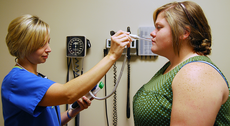With 449 confirmed cases of H1N1, or “swine flu”, throughout the state, University Health Services is urging students to follow the necessary precautions to help prevent the spread of the virus.Diane Garvey, director of University Health Services, said the Nicholls community should not panic. Instead, students and faculty should stay aware of their daily activities in regards to what they touch and share with others.
To aid in the prevention of H1N1, Garvey said people should wash their hands regularly, use hand sanitizer, eat a healthy diet and get an adequate amount of rest.
Garvey also suggested students and staff exercise and find healthy ways to alleviate stress. Too much stress can actually lower one’s immune system.
Because H1N1 is passed on from person to person, everyone should maintain awareness of daily contact with other people and shy away from sharing items like cell phones and water bottles, Garvey said. And for students sharing residence halls or other housing, they should keep all common areas, like the kitchen and bathroom, clean.
If students or faculty begin to notice flu-like symptoms, they should immediately see a private physician or schedule an appointment with University Health Services. They should also follow their doctor’s treatment completely, Garvey said.
“If this is not adequately treated, it can become very serious,” Garvey said.
It is also important to ensure the flu-victim is well-fed, Garvey said. Students with a meal plan can take advantage of the sick tray system offered by the Galliano Dining Hall on campus.
Garvey said the reason H1N1 has received more attention than seasonal flu is because of the age range the disease typically affects. The seasonal flu is more common for infants one year old and younger and adults 65 years and older. However, H1N1 cases have been reported in children and adults ranging from five to 24 years old. Thus, college students fall into this age range.
The cost of testing also differs for the two forms of flu. While the price of testing for the seasonal flu is about $25, the cost of being tested for H1N1 is almost triple that at $90. Neither amount includes lab fees.
While the H1N1 virus is probably a flu that hits prematurely and not in the usual flu season, treatment for the two viruses are identical, Garvey said.
According to the state Department of Health and Hospitals, only about 450 cases of H1N1 have been confirmed in the state. This number includes five cases in Lafourche Parish and six in Terrebonne Parish.
However, the exact number of actual H1N1 cases on the Nicholls campus is difficult to indicate, Garvey said.
Kequawana Lewis, a nursing sophomore from New Orleans, said students should be concerned about this virus. She and her friends have refrained from sharing soft drinks as a preventative measure.
Laci Toups, a dietetics sophomore from Galliano, is also taking precautions, carrying hand sanitizer with her and taking daily vitamins to boost her immune system.
University Health Services is taking measures to spread the word about H1N1 and preventative actions that can be taken against it. It is also working with the Office of Environmental Safety, talking to on-campus groups, posting ‘wash hands’ signs, offering free hand sanitizers, distributing flyers with how-to instructions on prevention and sending mass e-mails with more information.








